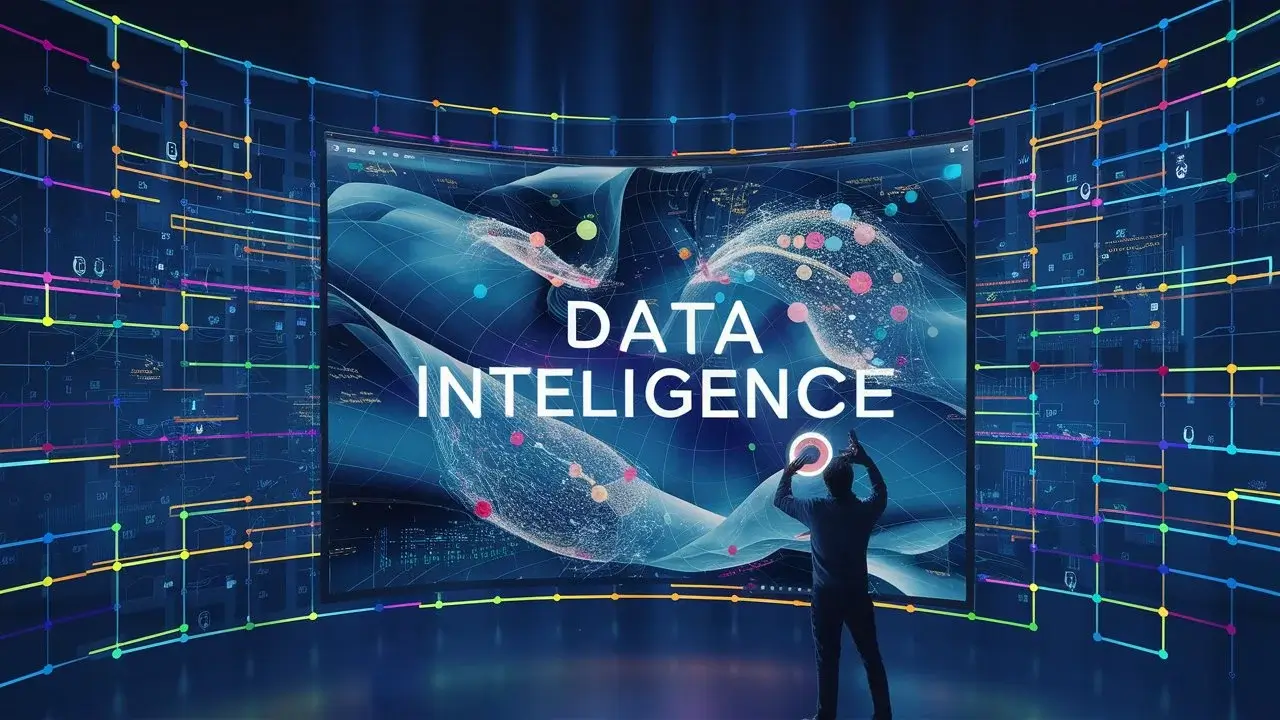In today’s fast-paced world, where data is abundant, data intelligence software stands out as an essential tool for businesses aiming to transform vast amounts of raw data into actionable insights. These solutions not only enhance decision-making but also streamline operations, forecast trends, and personalize customer interactions.
Understanding Data Intelligence Software
Data intelligence software helps organizations analyze and interpret complex data sets, enabling them to make informed decisions. Here’s how it impacts various business aspects:
Key Features:
- Data Integration: Combines data from multiple sources into a coherent framework for real-time analysis.
- Advanced Analytics: Utilizes machine learning algorithms and statistical tools to predict trends and patterns.
- Data Visualization: Offers intuitive dashboards and reports that simplify the interpretation of complex datasets.
Benefits of Data Intelligence:
- Enhanced Decision Making: Empowers businesses with data-driven insights for strategic planning.
- Operational Efficiency: Automates and optimizes processes to reduce costs and increase productivity.
- Improved Customer Insights: Deepens understanding of customer preferences and behaviors to tailor services and products.
Applications Across Industries
Healthcare
- Predictive Analytics: Improves patient outcomes by predicting health trends and potential emergencies.
Finance
- Risk Management: Assesses credit risk and detects fraudulent activity through sophisticated analytical models.
Retail
- Customer Personalization: Enhances shopping experiences with customized recommendations based on buying habits.
Manufacturing
- Supply Chain Optimization: Monitors and optimizes supply chain operations to mitigate risks and reduce overheads.
Choosing the Right Data Intelligence Solution
When selecting a data intelligence software, consider the following factors:
- Scalability: Ensures the software can handle increasing data volumes as your business grows.
- User Interface: Looks for intuitive and user-friendly dashboards that suit your team’s technical proficiency.
- Integration Capabilities: Checks compatibility with existing IT infrastructure and data sources.
- Support and Training: Evaluates the level of customer support and training provided to maximize software utility.
How does data intelligence software benefit businesses?
Data intelligence software provides numerous benefits to businesses across various industries. Here’s a detailed breakdown of how these solutions can enhance different aspects of a company:
1. Enhanced Decision Making
- Data-driven Insights: Offers comprehensive analytics that helps businesses make informed decisions by understanding market trends, customer behavior, and operational efficiencies.
- Predictive Analysis: Utilizes historical data to forecast future trends, helping companies prepare better for what’s ahead.
2. Improved Efficiency and Productivity
- Automation of Routine Tasks: Automates data collection and analysis, freeing up employee time for more strategic activities.
- Process Optimization: Identifies inefficiencies within business processes and suggests optimizations, reducing time and cost.
3. Increased Revenue
- Customer Insights: Provides deeper insights into customer preferences and behaviors, enabling more targeted marketing and improved customer engagement.
- Opportunity Identification: Helps identify new business opportunities by analyzing market trends and consumer data.
4. Risk Management
- Fraud Detection: Employs advanced algorithms to detect and prevent fraud in real-time, significantly lowering the risk of financial loss.
- Compliance Monitoring: Ensures that business operations stay in line with regulatory requirements, avoiding penalties and fines.
5. Competitive Advantage
- Real-Time Data Access: Provides instant access to updated data, offering a competitive edge by allowing rapid response to market changes.
- Innovation Facilitation: Encourages the exploration of new business models and strategies based on revealed data insights.
6. Personalized Customer Experiences
- Customization Capabilities: Enables businesses to tailor products and services to individual customer needs, enhancing satisfaction and loyalty.
7. Strategic Planning
- Long-term Forecasting: Assists in strategic planning with long-term forecasts that account for various market dynamics and scenarios.
- Resource Allocation: Optimizes resource allocation by identifying key areas that require investment, based on predictive analytics.
By leveraging data intelligence software, businesses can not only improve their operational efficiencies but also enhance customer satisfaction, manage risks more effectively, and stay ahead of the competition. This results in a more agile, proactive, and data-driven approach to business management.
How does data intelligence software impact customer behavior analysis?
Data intelligence software significantly impacts customer behavior analysis by providing tools and insights that help businesses understand their customers more deeply and tailor interactions to better meet their needs. Here’s a detailed look at the ways data intelligence software transforms customer behavior analysis:
1. Data Aggregation
- Multifaceted Data Collection: Gathers data from various sources including social media, transaction records, and customer feedback to create a comprehensive view of consumer behavior.
- Unified Customer Profiles: Integrates data into a single, unified customer profile that provides a holistic view of each customer’s interactions and preferences.
2. Advanced Analytical Tools
- Behavioral Segmentation: Uses advanced algorithms to segment customers based on behavioral patterns, demographics, and psychographics, allowing for more targeted marketing.
- Pattern Recognition: Identifies common behaviors and trends across customer data, helping predict future actions and preferences.
3. Real-time Analytics
- Instant Feedback: Allows businesses to understand how customers are reacting to products or campaigns in real time, enabling immediate adjustments to improve experiences.
- Dynamic Personalization: Adapts website interfaces, product recommendations, and content in real-time based on the user’s actions during a browsing session.
4. Predictive Analytics
- Customer Lifecycle Predictions: Forecasts critical points in the customer lifecycle, such as likely time of purchase, potential churn, and upsell opportunities.
- Anticipating Needs: Utilizes historical data to predict future needs and preferences, facilitating proactive service and improved customer engagement.
5. Enhanced Decision Making
- Strategic Insights: Provides actionable insights that aid in decision-making regarding product development, marketing strategies, and customer service improvements.
- Optimized Resource Allocation: Directs resources to campaigns and strategies proven to enhance customer engagement and retention.
6. Improved Customer Experience
- Personalized Marketing: Delivers tailored marketing messages based on individual consumer behavior and preferences, which enhances the customer experience and increases engagement.
- Customer Satisfaction Analysis: Uses sentiment analysis to gauge customer satisfaction across digital touchpoints, providing feedback on what changes can enhance the customer journey.
7. Long-term Relationship Building
- Loyalty Programs: Helps design and manage customer loyalty programs effectively by analyzing participation rates and personalizing rewards.
- Customer Retention Strategies: Develops effective retention strategies by understanding at-risk behaviors and intervening at the right time with the right offers or communications.
In summary, data intelligence software enables businesses to extract, analyze, and act on customer data in sophisticated ways, transforming how organizations approach customer relationship management. By leveraging these insights, businesses can considerably improve customer retention, enhance satisfaction, and drive sales growth.
How does data aggregation impact customer behavior analysis?
Data aggregation plays a crucial role in customer behavior analysis by compiling diverse data sources into a cohesive, comprehensive overview of each customer’s interactions and preferences. Here’s an in-depth exploration of how data aggregation impacts customer behavior analysis:
1. Comprehensive Data Collection
- Variety of Data Sources: Data aggregation involves collecting data from various touchpoints such as social media interactions, website browsing behaviors, purchase histories, and customer service interactions.
- Holistic Customer Profiles: By combining these diverse data sources, businesses can create complete profiles for each customer, reflecting their behaviors, preferences, and potential needs.
2. Accurate Customer Segmentation
- Demographic and Psychographic Details: Aggregated data allows for more detailed segmentation of the customer base, taking into account not just basic demographics, but also psychographics such as lifestyle, values, and attitudes.
- Enhanced Targeting: This enriched segmentation enables businesses to tailor their marketing efforts more precisely, ensuring that messages and offers are relevant to each specific group.
3. Improved Predictive Analytics
- Behavioral Patterns and Trends: With comprehensive data, predictive models can analyze past behaviors to forecast future actions more accurately, such as predicting purchase behavior or identifying potential churn risks.
- Customization of Offers: Businesses can use insights derived from aggregated data to customize their offers, enhancing the likelihood of acceptance and improving customer satisfaction.
4. Enhanced Personalization
- Real-time Data Synthesis: Aggregated data can be analyzed in real-time to offer instant personalization in marketing campaigns and customer interactions.
- Dynamic Content Customization: Based on comprehensive customer profiles, companies can alter website content, emails, and other customer-facing materials dynamically to match individual preferences and behaviors.
5. Better Customer Insights
- Deep Understanding: Aggregation helps in understanding the depth and breadth of customer preferences and pain points, which informs product development and customer service strategies.
- Feedback Loops: Continuous aggregation and analysis allow for ongoing refinement of strategies based on customer feedback and behavior changes.
6. Operational Efficiency
- Streamlined Data Management: Data aggregation systems reduce the complexity of managing multiple data streams, making the data analysis process more efficient.
- Cost Reduction: With all relevant data readily available and easily accessible, the time and resources spent on gathering and processing information are significantly reduced.
7. Consistency and Accuracy
- Error Reduction: Aggregating data from multiple sources can help in verifying the accuracy of the data through cross-referencing, reducing the likelihood of errors.
- Consistent Customer Experience: Ensures all departments within the company have the same, up-to-date information about customers, leading to consistent customer experiences across various touchpoints.
Therefore, data aggregation is foundational in customer behavior analysis, providing the data quality and breadth necessary to derive meaningful insights that drive personalized customer interactions and strategic business decisions. These capabilities significantly boost the effectiveness of customer relationship management and overall business performance.
Conclusion
Data intelligence software is no longer a luxury but a necessity in leveraging the vast reservoirs of data that modern enterprises encounter. Investing in a robust data intelligence solution not only gives you a competitive edge but also aligns your business strategies with real-time insights and predictions. Make the wise choice today and transform your data into your most valuable asset.



